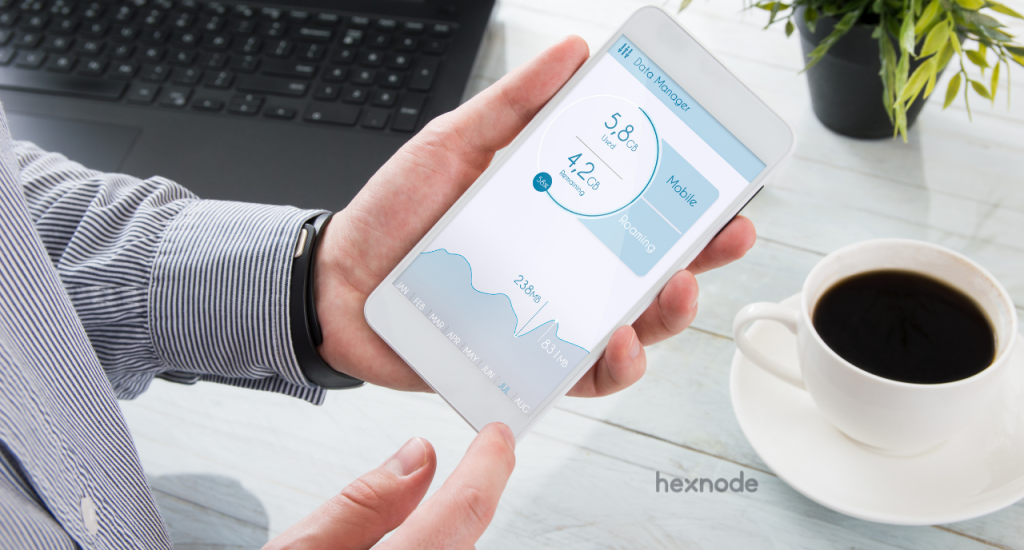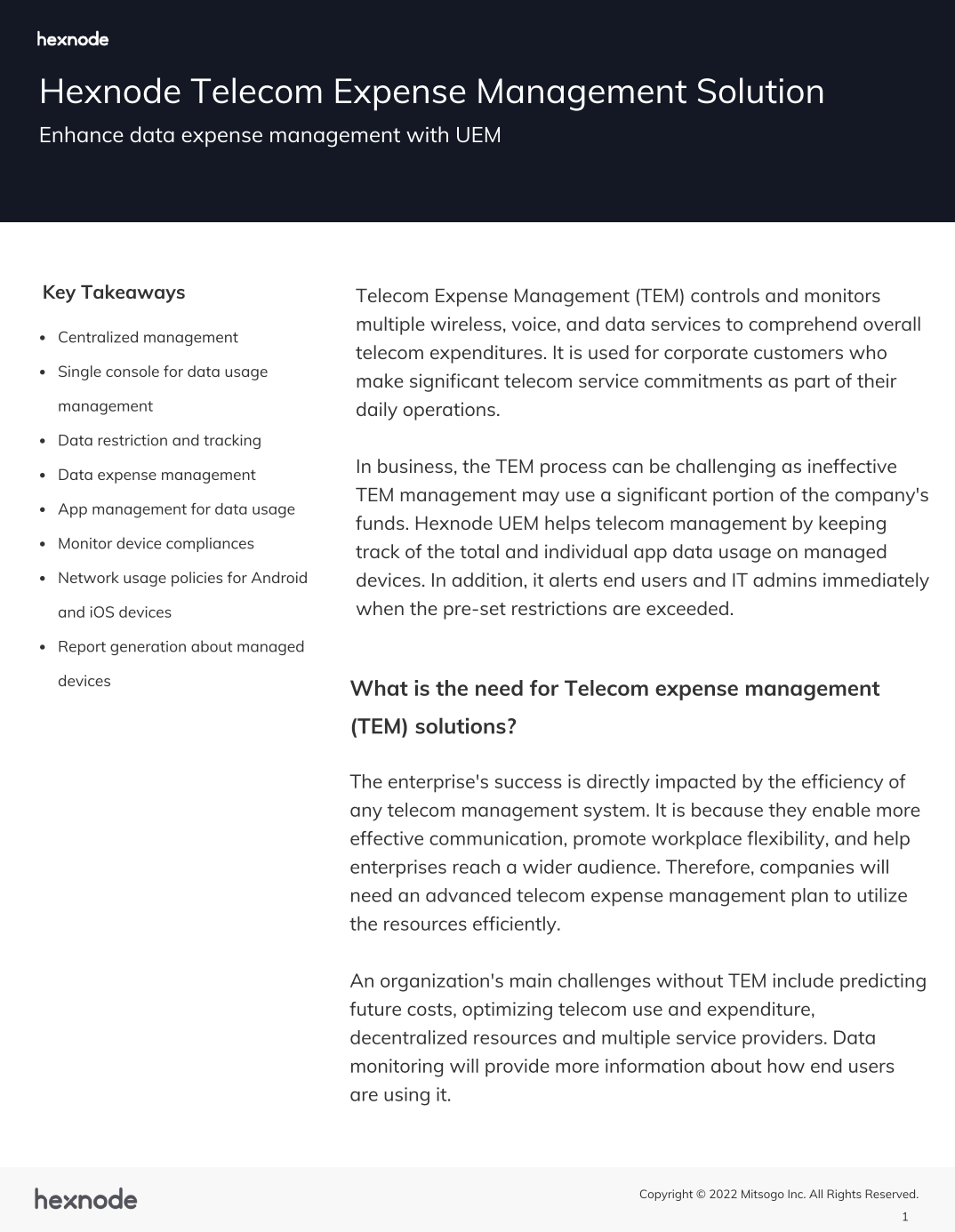How UEMs help in device health monitoring and alerting
Device health monitoring and alerting helps IT admins identify and resolve device health issues in the early stages.

Get fresh insights, pro tips, and thought starters–only the best of posts for you.
Lizzie Warren
Nov 18, 2022
9 min read





Due to the many data-hungry apps on our phones, there is a considerable probability that we will go over our daily data consumption limits (unless you have an unlimited data plan). In such cases, we will undoubtedly go over our allotted data plan and be required to pay for data overages, breaking the bank because of the expensive data plans 
I Declare Bankruptcy Bankrupt GIFs Tenor
So, what can you do to ensure you don’t end up bankrupt? The answer is simple; have a proper data usage monitoring system. This applies to businesses too. It is essential for workplaces to avoid additional costs associated with data consumption. Keeping an eye on the network’s bandwidth usage helps diagnose issues, identify the devices that use the most data, and determine whether the devices connected to the network are authorized.
Internet usage in the workspace may range from browsing for research purposes to aimlessly scrolling through social media apps. Many organizations unwisely provide their employees unrestricted access to the internet based on the trust that they will not misuse them. What if one of the parties fails to uphold its commitments? This is why organizations must place a high value on having visibility and control over data usage.
The best solution for managing organizational productivity is to set rules for the appropriate data usage rather than limiting access to it. The built-in data management features in the devices need to be implemented for organizations to monitor and regulate data usage. Moreover, the telecom expense management (TEM) feature provided by UEMs is helpful for company-owned devices and for BYOD (bring your own device) situations where the company splits telecom costs with the employees or covers personal mobile expenses.

If you don’t have an unlimited data plan, it makes sense to reduce the use of data because the more you use, the more you pay. Now there are a variety of alternatives for finding out how much data we’ve consumed, including direct text message delivery to our phones and via internet-usage apps or websites. So, let’s discuss some methods that help monitor and control data usage both individually and at an organizational level.
The simplest method is to check your phone settings to see which apps use the most mobile data. You can do that by:
Navigate to Settings > Cellular and scroll down to view data usage.
The summary of the billing cycle and the total amount of data used can be seen through this. By checking and limiting the sources of applications that consume the majority of data, the users can use this method to plan how to spend the phone’s data.
Navigate to Settings > Data or Settings > Connections > Data usage.
This setting allows users to view their data usage and set mobile data limits. In addition, they can see how much data each app uses daily. This screen also shows the billing period and total mobile data consumed.
Another possible method to view the data usage is to visit the network provider’s website. However, although the statistics from this website are quite accurate, it is not practical to visit these websites frequently to obtain a real-time data use report. Moreover, the data usage reports need more detail because it’s difficult to determine which apps are using up your data so quickly.
Some popular network providers in the US include AT&T Internet, Verizon Internet, Xfinity Internet and many more. For AT&T (American Telephone and Telegraph) subscribers, the quickest way to obtain recent data usage is to call *3282# or *DATA#. They can manage their accounts, obtain official data consumption reports, and carry out other account administration tasks using the myAT&T app. The user will receive a free text message with their estimated remaining messaging and data balance.
Monitoring data usage using third-party apps will help the employees maintain control over their unnecessary usage of data for personal activities. These apps have all the necessary components of a data monitoring system, such as the capacity to track throughout time frames that correspond to the user billing cycle, permitting users to create consumption alarms and continuously monitor mobile data and Wi-Fi usage.
Moreover, the users can use this data usage app to forecast when they will exceed the data limit and set daily quotas. Users can use several apps for this purpose, including the Data usage app for Android and iOS, My Verizon app, My Data Manager app and many more. In addition, organizations can utilize the shared plan for data monitoring offered by these apps on work devices.
Effective Telecom expense management (TEM) is always crucial for organizations. Large businesses with many telecom services spread over numerous locations may find tracking their data usage expenditures far more complex. Therefore, organizations can rely on TEM software in this scenario. Even though the usual process can be challenging for organizations, an effective TEM solution can help them cut internet costs.

UEM solutions like Hexnode offers TEM features, including the ability to monitor the overall and per-app data usage on managed devices. Furthermore, when the pre-set limitations are violated, it promptly notifies end users and IT admins. Doesn’t it make managing your expenses easier to have a system that alerts you when your Wi-Fi data usage exceeds a pre-set limit, like 10 GB?
Hexnode UEM provides data usage management for both Android and iOS devices. The “Network data usage management” feature helps IT admins track and remotely manage mobile data usage on Android devices. The key capabilities offered under the Network Data Usage Management features for Android devices include app-specific limits, data consumption tracking, usage notifications, and network restrictions.
Additionally, email alert warnings are sent to admins and employees when mobile data usage exceeds the specified level. This Hexnode functionality is supported by Android 6.0+ and Android TV 6.0+.
For iOS devices, there are two key expense management capabilities. They are Network data usage management and Network usage rules. IT admins can track and report data through these policies, preventing per-app data usage on roaming and blocking cellular per-app data usage.
The “Forced Data Usage Sync” option ensures that data usage is consistently recorded. Admin can set the monthly, weekly, or daily data use cycle using this functionality. This feature helps to monitor mobile and Wi-Fi data usage on devices. It even provides data usage notifications, usage cycle reset time and a lot more.
The use of cellular or roaming data by managed apps can be restricted by the enterprise using network usage rules for iOS devices. This functionality enables administrators to manage unnecessary data costs in the company. In addition, monitoring cellular or roaming data usage is possible with the network usage rules.

The Telecom Expense Management (TEM) process can be complex in business as inefficient TEM management can result in a considerable loss. However, proper telecom expense management can control and monitor the telecom expenses of an organization.
Download the datasheetThe effectiveness of the data usage management system directly affects the business’s success. Monitoring and managing data consumption saves a lot of money for organizations. Therefore, understanding how to monitor your data usage is crucial.
The methods mentioned in this blog will help you follow a data diet and gradually lower the excess data usage, thereby preventing data overages.
Try out 14-day free trial of Hexnode UEM to effectively monitor and manage the data usage in your organization.
Start Free Trial Now